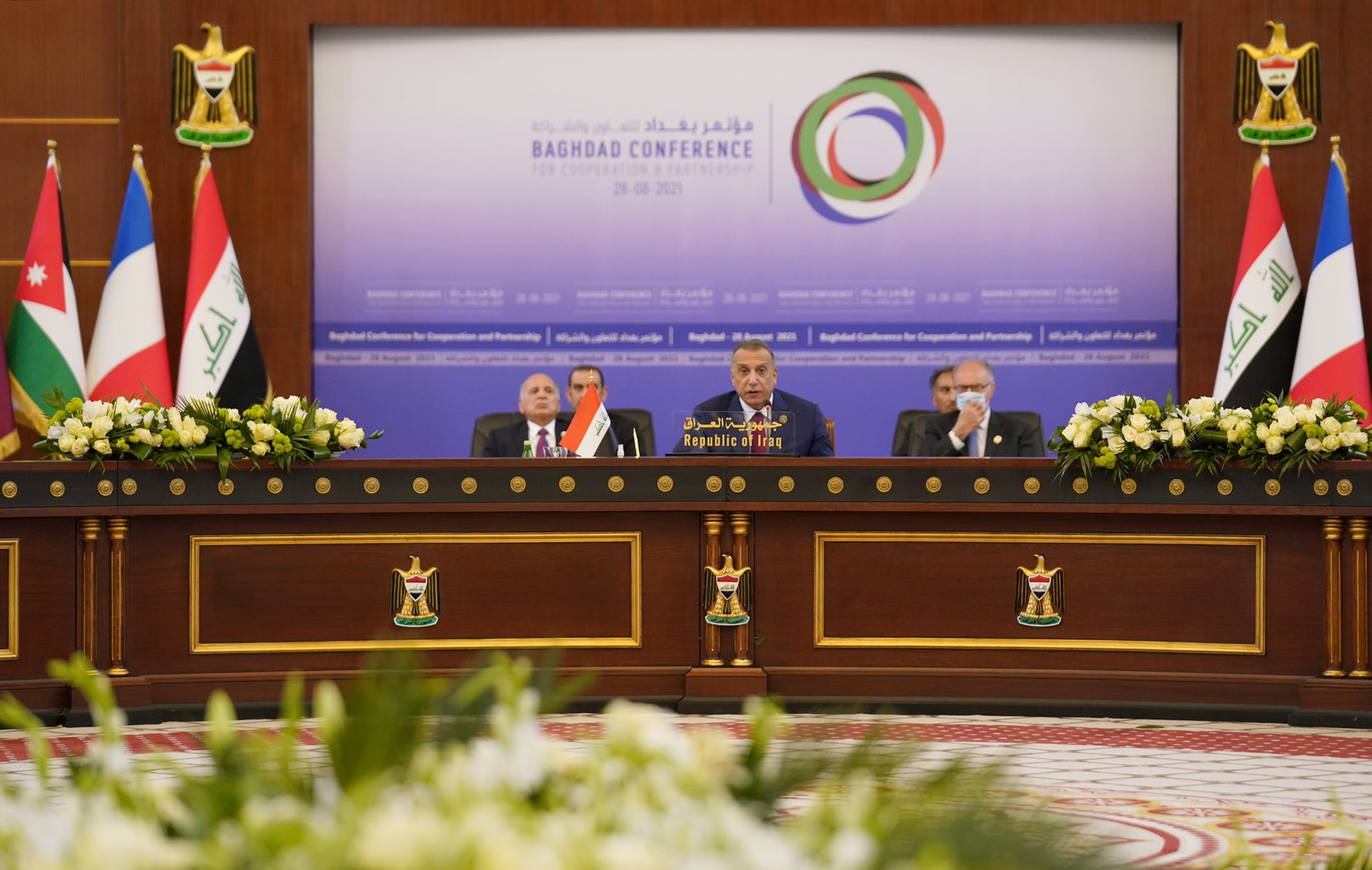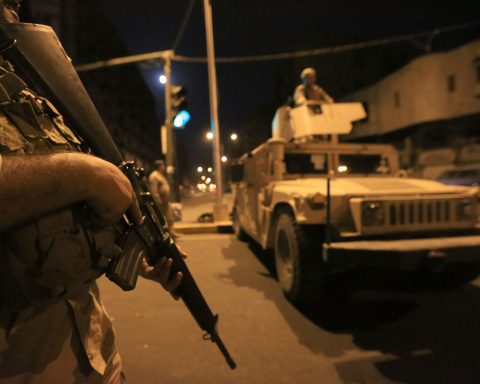In an attempt to promote Iraq as the Switzerland of the Middle East, a neutral ground from which regional rivals can hash out agreements, Prime Minister Mustafa al-Kadhimi hosted a regional summit on August 28, with the unusual inclusion of France, that brought together regional foes Saudi Arabia and Iran, as well as Turkey, Qatar, the UAE, Jordan, Egypt, and Kuwait. However, rather than Baghdad being any kind of neutral territory, it is clear that the summit served only the purpose of papering over the significant cracks that plague Iraq domestically, while having the additional benefit of giving Iran a platform to bring regional powers to a foreign capital that it has long bragged it controls.
No real diplomatic breakthroughs
Even before the summit, Iran made it clear that any diplomatic breakthroughs with rival Saudi Arabia, or anyone else for that matter, would depend on the progress made in the Vienna negotiations that it is currently engaged in with the United States. Currently, both Tehran and Washington have made little progress on a revival of the Joint Comprehensive Plan of Action, better known as the JCPOA or the Iran nuclear deal, aside from stating that they wish to revive it.
The idea behind this is simple – there is simply no point in Tehran cutting deals with Riyadh when they may need to escalate against them in order to force American compliance. After all, the Saudis are dependent on the US diplomatically, militarily, and economically, and they are considered amongst Washington’s closest allies in the region, making them a lucrative target for Iranian reprisals against the “Great Satan”, as it is fond of describing America. Indeed, it was not that long ago when Iranian Houthi proxies shut down Saudi oil production in 2019 by launching devastating drone strikes on two major oil facilities in the Kingdom.
Iran’s diplomatic calculus is that it would prefer to engage in hushed talks with Saudi Arabia, which have again been facilitated by Iraq since April this year, and to keep the oil-rich monarchy that is desperate for regional stability on a hook, while it hashes out a deal with Riyadh’s senior partner in Washington. Once, and if, that is achieved, it is highly likely that we will see a denouncement of sorts between the two rivals, with Iran keeping all its recent territorial acquisitions and influence in Iraq, Syria, and elsewhere in exchange for Saudi Arabia being able to extract itself from the Yemeni quagmire and guarantees for the security of its economically vital energy industry. In such a scenario, Iran would be the clear winner.
As such, at least for Iran, the Baghdad summit was less about regional cooperation and partnership, and more about defusing tensions at a fortuitous moment when the United States has been forced into a humiliating withdrawal from Afghanistan. Washington’s allies, including Iraq and Saudi Arabia, saw how the Biden administration abandoned their client regime in Kabul, which quickly collapsed in the face of a determined and lightning Taliban advance. Baghdad is also acutely aware of how its own state, established by the American occupation, can easily unravel should the US decide to completely disengage from Iraq, which explains why French President Emmanuel Macron insisted France will maintain a military presence regardless of American decisions. The likelihood of Paris being able to fill a vacuum left by Washington, however, is debatable.
More to the point, Iraq, Saudi Arabia, Turkey, and other attendees would rather a regional de-escalation framework be established just in case the United States ever decides to disengage, leaving a power vacuum that can be exploited by hungry and emerging powers like China and Russia, and also non-state actors looking to benefit from the insecurity generated, including terrorist organizations like the so-called Islamic State.
In Turkey’s unique context, this de-escalation mechanism – should it ever materialize – would be ideal as the United States has proven itself to be, time and again, a fickle friend. Ankara will remember how coy former President Barack Obama and his team were as a coup attempt was underway in 2016, and waited until it became clear that the democratically elected President Recep Tayyip Erdoğan would prevail, not to mention Washington’s support for Kurdish terror groups like the YPG in Syria, which in effect empowered the PKK, that considered a terrorist organization by the US, inside Turkey itself.
In that regard, the Baghdad summit may be a start at beginning a conversation about regional dynamics and how to reduce simmering tensions in an already fraught neighbourhood, but it achieved nothing in terms of any major diplomatic breakthroughs.
Iraq’s domestic problems are more important
If the Iraqi elites, who were installed in power after the US-led invasion in 2003, are jittery over a repeat of Kabul occurring in Baghdad, then rather than trying to curry favour with regional powers to prop them up, it would be a wiser expenditure of time and effort to fix Iraq’s myriad structural problems that have caused Iraqis to have such apathy towards their political process that hardly anyone bothers to vote anymore, where the last vote attracted a paltry 44.5 percent turnout.
The entire summit reeks of a political theatre that is conveniently taking place a month and a half before national elections are due to take place. It appears that the al-Kadhimi administration is trying to polish the Iraqi political process’ credentials by giving it the appearance of regional clout. But the effect has actually been reversed, as Iraqi voters will observe that the summit appears to largely be for Iran’s benefit and that Iraqi politicians prefer to deal with neighbouring states rather than addressing the fundamental problems plaguing Iraq’s state, economy, and society.
Iraqis suffer from a polluted water supply that only recently hospitalized thousands in Basra alone. Similarly, and despite being one of the most energy-rich countries in the world, Iraqis suffer from repeated and extended power supply cuts and are forced to import electricity from Iran, not to mention the rampant corruption and mismanagement that recently led to a huge blaze in a hospital coronavirus ward that killed almost a hundred patients.
Considering the above, it does not matter whether Baghdad attracts the support of its neighbours, or positions itself as a “neutral” table for Iran to gather the region’s leaders around. Iran, France, or any other country cannot stop the Iraqi state from collapsing as it lacks legitimacy amongst its own people who have been protesting almost continuously since 2019. Rather than focusing on pleasing an international audience, Baghdad should instead focus on pleasing its own people who have spent 18 years suffering and have lost faith in a political process that does not serve them.














